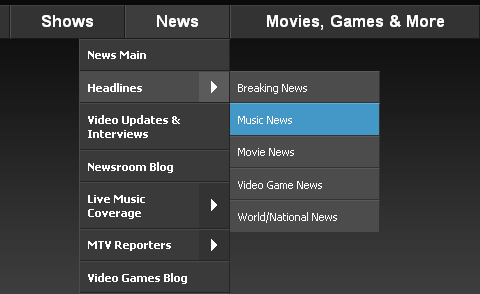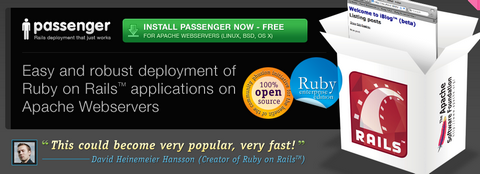Free CSS Drop-Down Menu Framework does not only separate HTML from CSS, but even CSS definitions are categorized into structural and thematic types. Thus creating a new drop-down means creating only a new theme since structure is permanent.
Your unordered List can be transformed by changing class name only. Available transformations including horizontal, vertical left-to-right, vertical right-to-left, horizontal linear and horizontal upwards. Free CSS Drop-Down Menu is cross browser that there are some configurations available for Windows Internet Explorer 5 or later, Mozilla Firefox 1.5 or later, Opera 7 or later, Apple Safari 2 or later.

Requirements: Internet Explorer 5+, Firefox 1.5+, Opera 7+, Apple Safari 2+
Demo: http://www.lwis.net/free-css-drop-down-menu/
License: GPL License
Peppy is a lightning fast CSS 3 compliant selector engine with no external library dependencies. Peppy can be used along side other libraries seamlessly.
As it stands now Peppy is faster1 than all other major JavaScript libraries with DOM querying capabilities (Prototype 1.6.0.3, JQuery 1.2.6, MooTools 1.2.1, EXT 2.2, DoJo 1.2.0, YUI 2.6.0). It is faster2 than Sizzle by John Resig and it also is cross browser (IE included). You can take a look for yourselves by using SlickSpeed Selectors Test and download Peppy here.
If you are designing your own JavaScript library or want to replace your existing libraries selector engine then Peppy is an ideal candidate.

Requirements: –
Demo: http://jamesdonaghue.com/static/peppy/
License: FreeBSD License
Raphaël is a small JavaScript library that should simplify your work with vector graphics on the web. In case you want to create your own specific chart or image crop-n-rotate widget, you can simply achieve it with this library.
Raphaël uses SVG and VML as a base for graphics creation. Because of that every created object is a DOM object so you can attach JavaScript event handlers or modify objects later. Raphaël’s goal is to provide an adapter that will make drawing cross-browser and easy. Currently library supports Firefox 3.0+, Safari 3.0+, Opera 9.5+ and Internet Explorer 6.0+.

Requirements: Firefox 3.0+, Safari 3.0+, Opera 9.5+ and Internet Explorer 6.0+
Demo: http://raphaeljs.com/
License: MIT License
The YUI development community is pleased to announce the release of version 2.6.0 of the YUI Library. 2.6.0 introduces a new Carousel Control, offers the Paginator Control for general use (it was previously bundled with DataTable), includes more than 450 total fixes, enhancements and optimizations, graduates eight components out of “beta,†and now ships with more than 290 functional examples.
The YUI Carousel Control provides a widget for browsing among a set of like objects arrayed vertically or horizontally in an overloaded page region. Like most YUI controls, Carousel can consume content from page markup using progressive enhancement techniques or be created, configured, and populated entirely via script. It has built-in support for the lazy-loading of content via XMLHttpRequest (aka Ajax) using YUI’s Connection Manager.
The YUI Paginator Control addresses the navigation aspect of chunked content, offering a set of controls that it can render into your UI to allow users to navigate through logical sections of local or remote data. It’s a great tool for managing page load times by reducing the amount of markup or data needed per page.
Requirements: YUI Framework
Demo: http://developer.yahoo.com/yui
License: BSD License

ZK is the a proven Ajax + Mobile framework designed to maximize enterprises operation efficiency and minimize the development cost. With groundbreaking Direct RIA architecture, ZK simplifies and speeds the creation, deployment and maintenance of rich Internet applications.
By programming user interfaces directly, developing Web application is as intuitive as programming desktop applications. By programming database and enterprise resource access directly, developers no longer have to worry about exposure of business logic to the client and exposure of business data over the Internet .
ZK is an open source Ajax + Mobile framework. ZK developer community is extremely active with 20+ translations, 100+ articles/blogs, and 100,000+ lines of codes, 700,000+ downloads, from 190+ countries.
Alos, ZK is designed from the ground up to be secure. ZK protects enterprise applications from cross-site scripting, malicious JavaScript/SQL injection, exposure of business logic to the client, and exposure of business data over Internet. Scalability, Clustering and Failover: ZK supports high scalability and availability with serializable user interfaces, and pluggable failover manager. ZK is compatible with the clustering and load balancing support found in modern application servers.
Requirements: –
Demo: http://www.zkoss.org/
License: GPL License

TWiki is a flexible, powerful, and easy to use enterprise wiki, enterprise collaboration platform and knowledge management system. It is a Structured Wiki, typically used to run a project development space, a document management system, a knowledge base, or any other groupware tool, on an intranet or on the internet. TWiki looks and feels like a normal Intranet or Internet web site. However it also has a Edit link at the bottom of every topic (web page), everybody can change a topic or add content by just using a browser.
Web content can be created collaboratively by using just a browser. Users without programming skills can create web applications. Developers can extend the functionality of TWiki with Plugins. TWiki fosters information flow within an organization; lets distributed teams work together seamlessly and productively; and eliminates the one-webmaster syndrome of outdated intranet content.
TWiki is GPLed software. The Perl CGI source code, templates and documentation is available for free.
Requirements: Perl CGI Supported Server
Demo: http://twiki.org/
License: GPL License

Like Ruby on Rails, Merb is an MVC framework. Unlike Rails, Merb is ORM-agnostic, JavaScript library agnostic, and template language agnostic, preferring plugins that add in support for a particular feature rather than trying to produce a monolithic library with everything in the core. Merb is also thread-safe and was originally engineered to handle multiple file uploads concurrently.
Merb is a simple, clearly documented core. Rather than trying to cram every feature under the sun into a single code base, we keep things to the bare minimum, without sacrificing anything important. The core code in Merb is kept simple and well organised meaning it’s easier to understand, maintain and extend.
Merb is featureful, flexible and extensible. For any features that aren’t covered in Merb’s core, there are plugins. Rather than reinvent the wheel with a custom plugin framework, these are implemented as RubyGems, giving us easy plugin installation, updates and versioning.
Requirements: –
Demo: http://merbivore.com
License: MIT License

Cappuccino is an open source application framework for developing applications that look and feel like the desktop software users are familiar with.
Cappuccino is built on top of standard web technologies like JavaScript, and it implements most of the familiar APIs from GNUstep and Apple’s Cocoa frameworks. When you program in Cappuccino, you don’t need to concern yourself with the complexities of traditional web technologies like HTML, CSS, or even the DOM. The unpleasantries of building complex cross browser applications are abstracted away for you.
Cappuccino was implemented using a new programming language called Objective-J, which is modelled after Objective-C and built entirely on top of JavaScript. Programs written in Objective-J are interpreted in the client, so no compilation or plugins are required.
Instead of doing all or most of the work on the server, Cappuccino applications do as much as possible in the client. A typical application would never reload, but rather send and recieve data using traditional AJAX techniques and then present that data in the client code.
Requirements: –
Demo: http://cappuccino.org/
License: LGPL License

You’re writing an email to invite a friend to meet at a local San Francisco restaurant that neither of you has been to. You’d like to include a map. Today, this involves the disjointed tasks of message composition on a web-mail service, mapping the address on a map site, searching for reviews on the restaurant on a search engine, and finally copying all links into the message being composed. And you haven’t even really sent a map or useful reviews—only links to them.
Mozilla Labs has announced the launch of Ubiquity. Ubiquity empower users to control the web browser with language-based instructions. (With search, users type what they want to find. With Ubiquity, they type what they want to do.) And it enables on-demand, user-generated mashups with existing open Web APIs. (In other words, allowing everyubone–not just Web developers–to remix the Web so it fits their needs, no matter what page they are on, or what they are doing.)
Ubiquity lets you map and insert maps anywhere; translate on-page; search amazon, google, wikipedia, yahoo, youtube, etc.; digg and twitter; lookup and insert yelp review; get the weather; syntax highlight any code you find; and a lot more. Ubiquity “command list†to see them all.
All of the code underlying the Ubiquity experiment is being released as open source software under the GPL/MPL/LGPL tri-license as well.
Requirements: –
Demo: http://labs.mozilla.com/2008/08/introducing-ubiquity/
License: GPL/MPL/LGPL Tri-License
Phusion Passenger is an Apache module, which makes deploying Ruby and Ruby on Rails applications on Apache a breeze. It follows the usual Ruby on Rails conventions, such as “Don’t-Repeat-Yourself” and ease of setup, while at the same time providing enough flexibility.
Phusion Passenger is a commercial supported open source product that enables people to deploy their Ruby on Rails applications in an upload-and-go manner, which is very reminiscent of the PHP way of deploying. Also, you can always get community support on Discussion board.

Requirements: Any OS, except Microsoft Windows
Demo: http://www.modrails.com
License: GPL License












